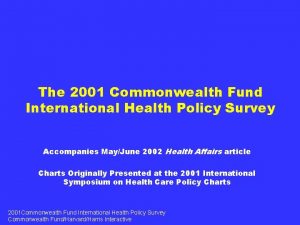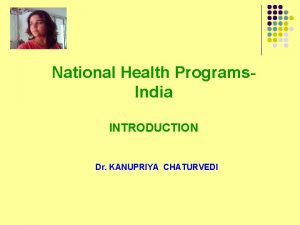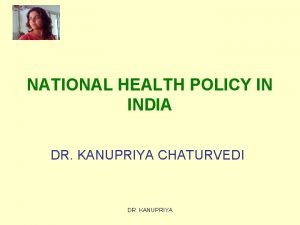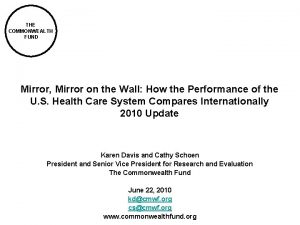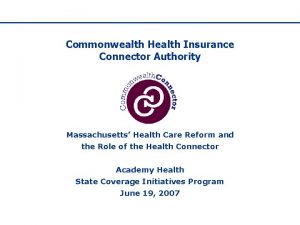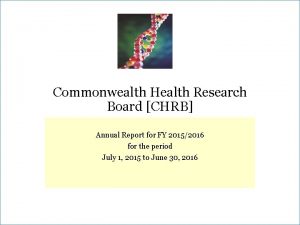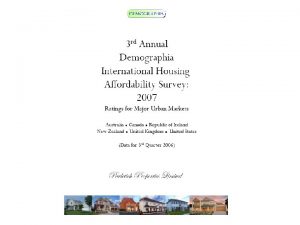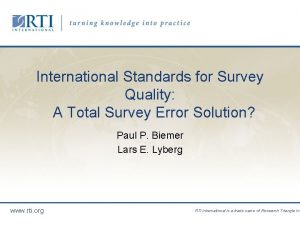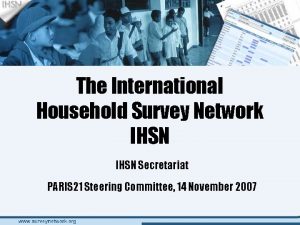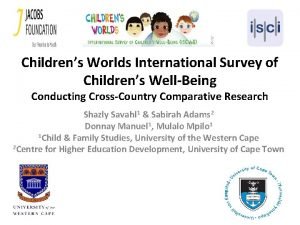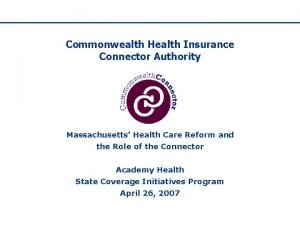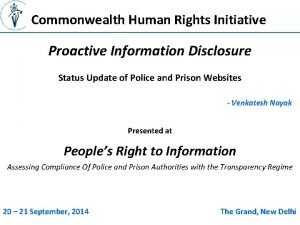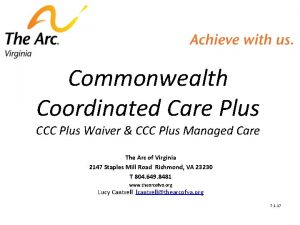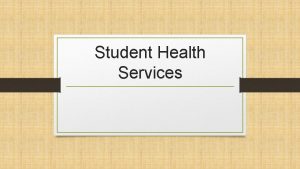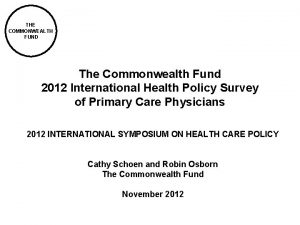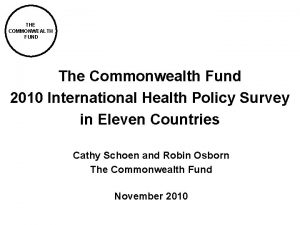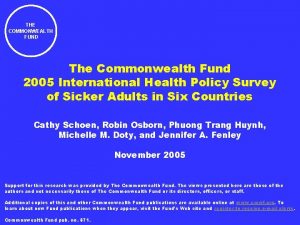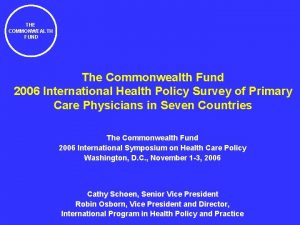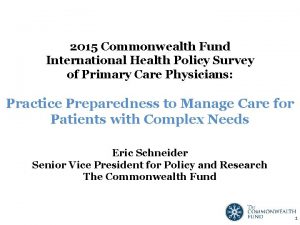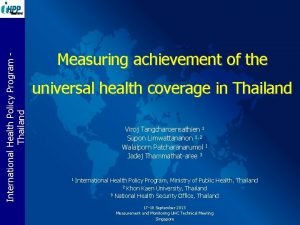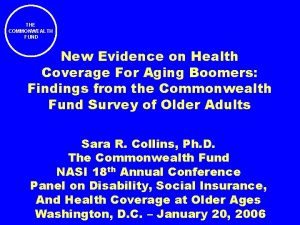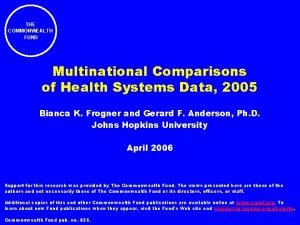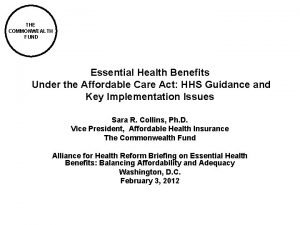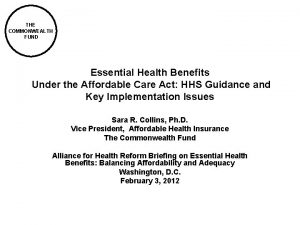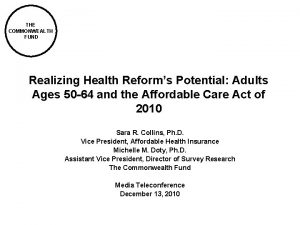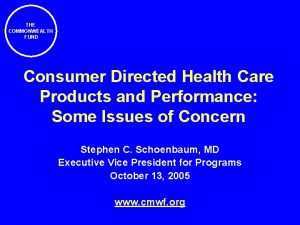The 2002 Commonwealth Fund International Health Policy Survey





































- Slides: 37

The 2002 Commonwealth Fund International Health Policy Survey Adults with Health Problems The Commonwealth Fund Harvard University School of Public Health Harris Interactive, Inc. For release with five-country article in May/June 2003 Health Affairs

Methods • Survey of sicker adults in Australia, Canada, New Zealand, United Kingdom, and the United States. Adults met at least one of the following criteria: – Self reported health status is fair or poor – Serious illness in the past 2 years – Hospitalized or had major surgery in the past 2 years • Final sample size of 750 in CA, NZ, UK and US. 844 in Australia • One fourth to one third of adults initially screened in each country • Conducted by Harris Interactive and subcontractors from March 25, 2002 to May 13, 2002 • Margin of error + or – 4 percentage points for differences between countries. 2002 Commonwealth Fund International Health Policy Survey Commonwealth Fund/Harvard/Harris Interactive Adults with health problems 2

Overall System View 2002 Commonwealth Fund International Health Policy Survey Commonwealth Fund/Harvard/Harris Interactive Adults with health problems 3

Dissatisfaction with the health care system Percent very or somewhat dissatisfied with their country’s health care system in general 2002 Commonwealth Fund International Health Policy Survey Commonwealth Fund/Harvard/Harris Interactive Adults with health problems 4

Two Biggest Problems with the Health Care System Most Frequently Cited Problems: AUS CAN NZ UK US High cost of health care 19 13 21 6 48 Inadequate coverage of services 9 8 6 4 25 Shortages 31 54 20 33 5 Waiting times 31 27 41 39 3 Not enough government funding 20 16 23 24 1 2002 Commonwealth Fund International Health Policy Survey Commonwealth Fund/Harvard/Harris Interactive Adults with health problems 5

Single Most Important Thing Government Can Do to Improve Health Care AUS CAN NZ UK US Spend more money 30 32 34 30 4 Increase number of health professionals 14 19 5 15 2 Reduce costs 5 1 5 3 16 Improve coverage 4 2 5 1 21 2002 Commonwealth Fund International Health Policy Survey Commonwealth Fund/Harvard/Harris Interactive Adults with health problems 6

Care Coordination 2002 Commonwealth Fund International Health Policy Survey Commonwealth Fund/Harvard/Harris Interactive Adults with health problems 7

Number of Doctors or Health Professionals Visited in the Past Two Years 2002 Commonwealth Fund International Health Policy Survey Commonwealth Fund/Harvard/Harris Interactive Adults with health problems 8

Care Coordination 2002 Commonwealth Fund International Health Policy Survey Commonwealth Fund/Harvard/Harris Interactive Adults with health problems 9

Percent reporting receiving conflicting information from different health professionals by number of doctors 2002 Commonwealth Fund International Health Policy Survey Commonwealth Fund/Harvard/Harris Interactive Adults with health problems 10

Percent reporting being sent for duplicate tests by different health professionals in the past 2 years by number of doctors 2002 Commonwealth Fund International Health Policy Survey Commonwealth Fund/Harvard/Harris Interactive Adults with health problems 11

Prescription Drugs 2002 Commonwealth Fund International Health Policy Survey Commonwealth Fund/Harvard/Harris Interactive Adults with health problems 12

Number of prescription medications taken regularly Percent who take… 2002 Commonwealth Fund International Health Policy Survey Commonwealth Fund/Harvard/Harris Interactive Adults with health problems 13

Percent saying doctor has not reviewed/discussed all of the medications they take in the past two years Base: Adults taking prescription drugs regularly 2002 Commonwealth Fund International Health Policy Survey Commonwealth Fund/Harvard/Harris Interactive Adults with health problems 14

Problems with prescription drugs Any prescription medications that you: AUS CAN NZ UK US Stopped taking without doctors advice due to side effects 15 17 16 16 19 Skip doses to make the medication last longer 9 8 7 6 16 Have been taking that cause serious side effects that the doctor didn’t tell you about 11 9 9 11 9 2002 Commonwealth Fund International Health Policy Survey Commonwealth Fund/Harvard/Harris Interactive Adults with health problems 15

Medication and Medical Errors 2002 Commonwealth Fund International Health Policy Survey Commonwealth Fund/Harvard/Harris Interactive Adults with health problems 16

Medication and Medical Errors Percent in the past two years: AUS CAN NZ UK US Given the wrong medication or wrong dose by a doctor, hospital or pharmacist 11 11 13 10 12 Believed a medical mistake was made in your treatment or care 19 20 18 13 23 Medication error or believed an error was made 23 25 23 18 28 2002 Commonwealth Fund International Health Policy Survey Commonwealth Fund/Harvard/Harris Interactive Adults with health problems 17

Among those reporting an error, percent who said error caused serious health consequences Base: Reported a medication error or believed an error was made in their care 2002 Commonwealth Fund International Health Policy Survey Commonwealth Fund/Harvard/Harris Interactive Adults with health problems 18

Percent reporting medication error or medical mistake in past 2 years by number of doctors 2002 Commonwealth Fund International Health Policy Survey Commonwealth Fund/Harvard/Harris Interactive Adults with health problems 19

Patient–Physician Communication and Ratings of Physician Care 2002 Commonwealth Fund International Health Policy Survey Commonwealth Fund/Harvard/Harris Interactive Adults with health problems 20

Communication with Physicians In the past 2 years: AUS CAN NZ UK US Left a doctor’s office without getting important questions answered 21 25 20 19 31 Did not follow a doctor’s advice 31 31 27 21 39 2002 Commonwealth Fund International Health Policy Survey Commonwealth Fund/Harvard/Harris Interactive Adults with health problems 21

Missed Opportunities in Patient Discussions with Regular Doctor 2002 Commonwealth Fund International Health Policy Survey Commonwealth Fund/Harvard/Harris Interactive Adults with health problems 22

Communication with Physicians About Coping with Illness Percent saying physician has NOT discussed the emotional burden of coping with condition in the past 2 years 2002 Commonwealth Fund International Health Policy Survey Commonwealth Fund/Harvard/Harris Interactive Adults with health problems 23

Patient Ratings of Physician Care Percent rating physician as excellent or very good: AUS CAN NZ UK US How well he or she diagnosed your problem 67 62 68 57 58 Spending enough time with you 64 57 72 55 52 Being accessible by phone or in person 57 52 68 50 51 Listening carefully to your health concerns 72 66 76 65 62 2002 Commonwealth Fund International Health Policy Survey Commonwealth Fund/Harvard/Harris Interactive Adults with health problems 24

Waiting Times, Access, and Access Problems Due to Cost 2002 Commonwealth Fund International Health Policy Survey Commonwealth Fund/Harvard/Harris Interactive Adults with health problems 25

Problems with Waiting Times to Get an Appointment with Regular Doctor Percent reporting waiting time for an appointment with regular physician was a big problem in the past 2 years 2002 Commonwealth Fund International Health Policy Survey Commonwealth Fund/Harvard/Harris Interactive Adults with health problems 26

Percent saying doctors not spending enough time during office visits was a big problem in the past 2 years 2002 Commonwealth Fund International Health Policy Survey Commonwealth Fund/Harvard/Harris Interactive Adults with health problems 27

Difficulty Seeing a Specialist Percent reporting it is very or somewhat difficult to see a specialist 2002 Commonwealth Fund International Health Policy Survey Commonwealth Fund/Harvard/Harris Interactive Adults with health problems 28

Reasons It Was Difficult to See Specialist* Base: Sicker adults reporting it somewhat or very difficult to see a specialist AUS CAN NZ UK US Having to wait for an appointment, long waiting times for type of care 74 86 61 75 40 Unable to afford/lack of (private) insurance 17 3 23 5 17 Being denied a referral or having to wait for a referral 2 10 10 6 31 Facilities or service not available locally or lack of doctors available 18 24 19 15 13 * Does not add to 100% due to multiple responses 2002 Commonwealth Fund International Health Policy Survey Commonwealth Fund/Harvard/Harris Interactive Adults with health problems 29

Percent reporting long waits to be admitted to the hospital were a big problem in the past 2 years Base: Hospitalized in past 2 years 2002 Commonwealth Fund International Health Policy Survey Commonwealth Fund/Harvard/Harris Interactive Adults with health problems 30

Percent reporting having a scheduled surgery or procedure delayed because of cancellation was a big problem in past 2 years Base: Hospitalized with major surgery in past 2 years 2002 Commonwealth Fund International Health Policy Survey Commonwealth Fund/Harvard/Harris Interactive Adults with health problems 31

Percent reporting delays or problems while discharge arrangements were being made Base: Respondent or family member hospitalized in the past 2 years 2002 Commonwealth Fund International Health Policy Survey Commonwealth Fund/Harvard/Harris Interactive Adults with health problems 32

Emergency Room Use Percent who used or tried to use an emergency room in the past two years 2002 Commonwealth Fund International Health Policy Survey Commonwealth Fund/Harvard/Harris Interactive Adults with health problems 33

Percent reporting waiting time for emergency care was a big problem Base: Used an emergency room in the past two years 2002 Commonwealth Fund International Health Policy Survey Commonwealth Fund/Harvard/Harris Interactive Adults with health problems 34

Access Problems Due to Cost In the past two years, did not do the following due to cost: AUS CAN NZ UK US Did not fill a prescription 23 19 20 10 35 Did not get medical care 16 9 26 4 28 Did not get recommended test, treatment, or follow up 16 10 15 5 26 Did not get dental care 44 35 47 21 40 2002 Commonwealth Fund International Health Policy Survey Commonwealth Fund/Harvard/Harris Interactive Adults with health problems 35

Summary and Implications • Experiences of adults with health problems indicate areas of common concerns and varying performance – Care coordination problems: duplicate tests, delays and conflicting information – Deficiencies in patient-doctor communications lead to missed opportunities – Medical care and medication errors • Access barriers exist in all five nations but the source and type of barrier vary widely • Opportunities exist to improve care and to learn as nations tackle areas of common concern • Yet, priority areas of emphasis are likely to differ 2002 Commonwealth Fund International Health Policy Survey Commonwealth Fund/Harvard/Harris Interactive Adults with health problems 36

Methods The Commonwealth Fund 2002 International Health Policy Survey consisted of interviews with adults with health problems in each of five countries: Australia, Canada, New Zealand, the United Kingdom, and the United States. To identify these adults, the survey screened initial random samples of adults 18 or older who met at least one of four criteria: reported their health as fair or poor; had serious illness, injury or disability that required intensive medical care in the past two years; or in the last two years had major surgery or had been hospitalized for something other than a normal, uncomplicated delivery of a baby. These questions resulted in a final sample of 750 or more “sicker adults” in each country who were eligible to participate in the full survey. (AUS 844, CAN 750, NZ 750, UK 750, US 755). This final survey sample represents one fourth to one third of the adults initially contacted. These sicker adults are among the most intensive users of the health care system and are particularly vulnerable to variations in quality and outcomes of care. Harris Interactive, Inc. and country affiliates conducted the interviews by telephone between March and May 2002 Commonwealth Fund International Health Policy Survey Commonwealth Fund/Harvard/Harris Interactive Adults with health problems 37
 Commonwealth fund international health policy survey
Commonwealth fund international health policy survey National health policy 2002
National health policy 2002 Dr. kanupriya chaturvedi
Dr. kanupriya chaturvedi Mirror mirror commonwealth fund
Mirror mirror commonwealth fund Commonwealth health insurance connector authority
Commonwealth health insurance connector authority Commonwealth health research board
Commonwealth health research board Fluctuating petty cash system
Fluctuating petty cash system 叫叫 abcd
叫叫 abcd China international fund management
China international fund management International monetary fund apush
International monetary fund apush International monetary fund
International monetary fund International monetary fund
International monetary fund Demographia housing affordability ratings
Demographia housing affordability ratings International quanity survey
International quanity survey International crime victim survey
International crime victim survey International household survey network
International household survey network International survey of children’s well-being
International survey of children’s well-being Commonwealth swimming pool
Commonwealth swimming pool Commonwealth of nations flag
Commonwealth of nations flag Commonwealth connector
Commonwealth connector What does being british mean to you
What does being british mean to you Ra no. 5250
Ra no. 5250 Commonwealth local government forum
Commonwealth local government forum Proactive commonwealth
Proactive commonwealth Commonwealth executive mba in bangladesh open university
Commonwealth executive mba in bangladesh open university Commonwealth cyber initiative
Commonwealth cyber initiative Ccc waiver
Ccc waiver Workplace readiness assessment
Workplace readiness assessment Commonwealth funds management
Commonwealth funds management Commonwealth exchange programme
Commonwealth exchange programme Commonwealth of pennsylvania department of public welfare
Commonwealth of pennsylvania department of public welfare Commonwealth
Commonwealth Virginia workplace readiness skills
Virginia workplace readiness skills Jeremy lee australia
Jeremy lee australia Commonwealth literature
Commonwealth literature Workplace readiness skills for the commonwealth
Workplace readiness skills for the commonwealth Bu shs patient connect
Bu shs patient connect Commonwealth bank not negotiable cheque
Commonwealth bank not negotiable cheque
